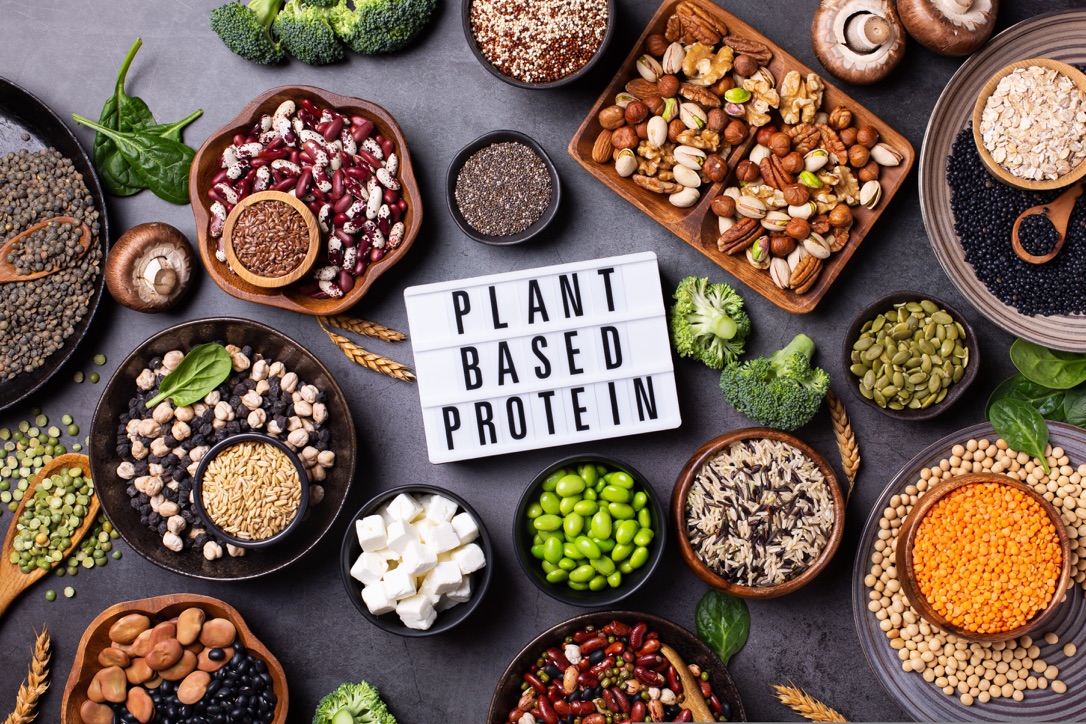
Let’s Power Up With Plants!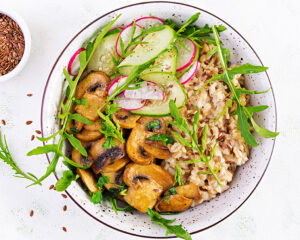
Eating plant-based doesn’t mean sacrificing protein or flavor. Whether you’re fully vegan, vegetarian, or just looking to add more plant-based meals to your diet, high-protein staples are key to staying satisfied and energized. From versatile legumes to nutrient-packed seeds, stocking your pantry with these powerhouse ingredients makes whipping up healthy, protein-rich meals a breeze. Let’s dive into the best high-protein plant-based staples and how to incorporate them into your daily routine.
Here’s a list of 45 high-protein plant-based staples that are perfect for creating nutritious meals:
Legumes and Beans
- Lentils (18g protein per cup, cooked): Great for soups, stews, and salads.
- Chickpeas (15g protein per cup, cooked): Use in hummus, curries, or roasted as a snack.
- Black beans (15g protein per cup, cooked): Perfect for burritos, bowls, or soups.
- Pinto beans (15g protein per cup, cooked): Perfect for refried beans, burritos, or soups.
- Lima beans (11g protein per cup, cooked): Creamy and mild, great for soups, salads, or casseroles.
- Green peas (8g protein per cup, cooked): Excellent in soups, stir-fries, or mashed as a side dish.
Soy Products
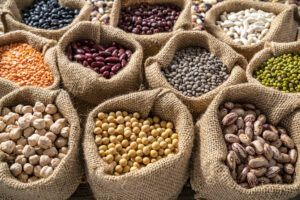
- Edamame (17g protein per cup, cooked): Snack on it, toss into salads, or add to stir-fries for a protein boost (*Also considered a Legume/Bean)
- Firm Tofu (21g protein per ½ cup), Silken Tofu (9g protein per ½ cup): Versatile for stir-fries, scrambles, and baking.
- Tempeh (15g protein per ½ cup): Great for sandwiches, stir-fries, or grilling.
- Soy milk (8g protein per cup): An excellent dairy alternative for smoothies and cereal.
Grains and Seeds
- Quinoa (8g protein per cup, cooked): A complete protein that works in salads, bowls, and casseroles.
- Amaranth (9g protein per cup, cooked): Use in porridge, baking, or as a side dish.
- Chia seeds (4g protein per 2 tbsp): Add to smoothies, puddings, or oatmeal.
- Hemp seeds (10g protein per 3 tbsp): Sprinkle on salads, yogurt, or baked goods.
- Sunflower seeds (7g protein per ¼ cup): Great for snacking, salads, or homemade seed butter.
- Pumpkin seeds (8g protein per ¼ cup): Use as a crunchy topping for soups, bowls, or granola.
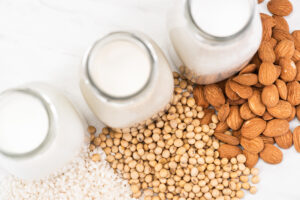
Nuts and Nut Butters (Nut Milks)
- Peanuts (7g protein per ¼ cup): Snack on them or use peanut butter in recipes.
- Almonds (6g protein per ¼ cup): Great for snacking or almond butter as a spread.
- Pistachios (6g protein per ¼ cup): Use in granola, baking, or as a topping.
- Cashews (5g protein per ¼ cup): Creamy and delicious in curries, sauces, or as a snack.
- Walnuts (4g protein per ¼ cup): Excellent for snacking, baking, or adding crunch to salads.
High Protein Vegetables
- Spinach (5g protein per cooked cup): Perfect in salads, smoothies, or sautéed as a side.
- Broccoli (4g protein per cup, cooked): Add to stir-fries, pasta dishes, or roasted for a crunchy side.
- Brussels sprouts (4g protein per cup, cooked): Roast or sauté for a delicious, nutrient-packed side dish.
- Asparagus (4g protein per cup, cooked): Great steamed, roasted, or grilled.
- Kale (3g protein per cooked cup): Toss into soups, stir-fries, or enjoy as a salad base.
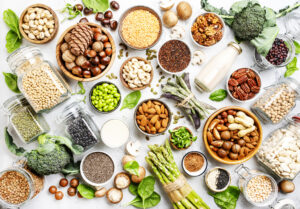
- Sweet corn (5g protein per cup, cooked): A versatile veggie for salads, soups, or side dishes.
- Artichokes (4g protein per cup, cooked): Great in dips, salads, or roasted with your favorite seasonings.
- Mushrooms (3g protein per cup, cooked): Use in stir-fries, pasta, or as a plant-based burger base.
- Potatoes (4g protein per medium potato, cooked): Bake, mash, or roast for a hearty side or main.
Whole Grains
- Quinoa (8g protein per cup, cooked): A complete protein, ideal for salads, bowls, or casseroles.
- Amaranth (9g protein per cup, cooked): Great in porridge, baking, or as a hearty side dish.
- Farro (5g protein per ½ cup, cooked): Chewy and nutty, perfect for soups, salads, or grain bowls.
- Buckwheat (6g protein per cup, cooked): Use in pancakes, porridge, grain breads, or as a side.
- Barley (4g protein per cup, cooked): A versatile grain for soups, risottos, or grain salads.
- Millet (6g protein per cup, cooked): A gluten-free grain that works in porridge, pilafs, or baked goods.
- Teff (10g protein per cup, cooked): A tiny, nutrient-packed grain used in porridge or traditional Ethiopian injera.
- Freekeh (8g protein per cup, cooked): Roasted green wheat with a smoky flavor, great in salads or pilafs.
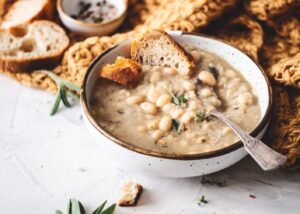
- Spelt (6g protein per cup, cooked): An ancient grain with a chewy texture, excellent in salads or as a rice substitute.
- Brown rice (5g protein per cup, cooked): A versatile staple for stir-fries, grain bowls, and side dishes.
- Wild rice (7g protein per cup, cooked): Technically a grass, it’s great for soups, salads, or stuffing.
- Oats (6g protein per cup, cooked): Perfect for oatmeal, baking, or savory grain bowls.
- Kamut (6g protein per cup, cooked): An ancient grain with a nutty flavor, great for grain salads or sides.
Other Plant-Based Staples
- Nutritional yeast (8g protein per 2 tbsp): Adds a cheesy (almost nutty) flavor to dishes while boosting protein.
- Spirulina (4g protein per tbsp): Mix into smoothies or sprinkle on savory dishes.
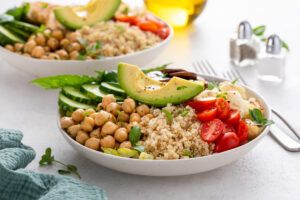
With these high-protein plant-based staples, fueling your body with nourishing, satisfying meals is simple and delicious. Whether you’re blending up a smoothie with hemp seeds, tossing chickpeas into a salad, or grilling tempeh for dinner, these versatile ingredients ensure you’re getting the nutrients you need. So, stock your pantry and fridge with these essentials, and start creating meals that are as nutritious as they are tasty. Your body—and your taste buds—will thank you!
For more information on protein facts in specific foods, go to nutritionfacts.org
Sincerely,
Jami Streyle
RN, MS, HWNC-BC, HNB-BC, Nurse Coach
jami@bodyofgraceliving.com
Share This Story
Stay Updated
Sign up to receive the latest news and tips from Body of Grace Living.


